Ecumenical Church Councils Part 2
The Important First Four Councils
Mike Ervin
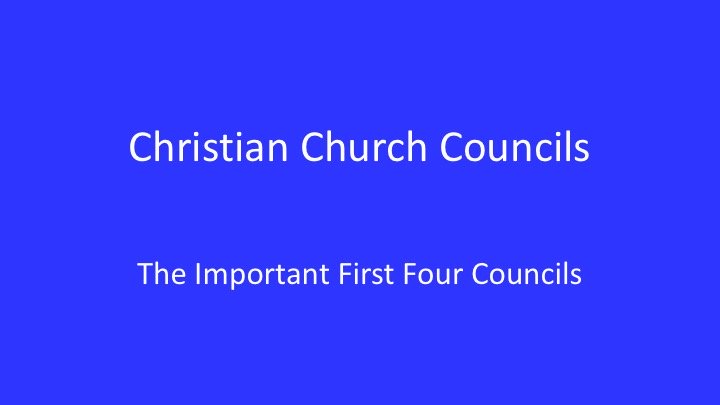
The Important First Four Councils
Last week we did a fairly major overview of the 21 major ecumenical church councils of Christianity. And, if you recall, we did a rather broad review of the last 13 of those councils that are considered to be predominately Roman Catholic Councils. I did those first to be sure you knew about what those were about.
But today, for our second and last, for a while, looks at church councils, we are now going to turn our attention to the first four church councils, the ones that Protestants give recognition to as being important to our doctrine, theology, and faith. Protestants, of course, did not exist when these councils were held. However, what went on in those councils was important to eventually defining the basic doctrines of Christianity, what things were true, and what things were heresies. And those things are still pretty much held true, by Protestants, and by both Roman and Eastern Orthodox Christians.
So, let’s dive into this.
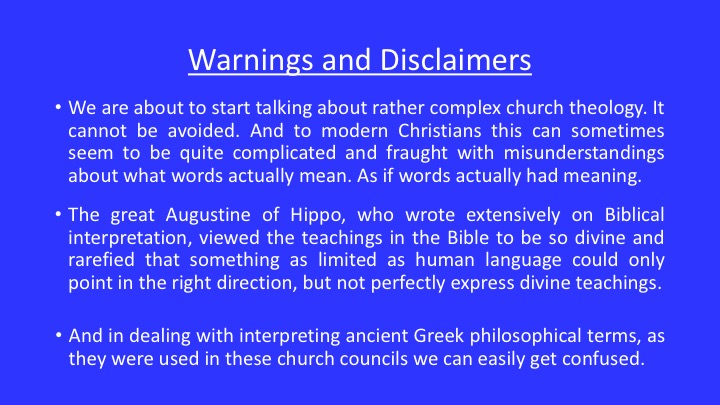
Warnings and Disclaimers
We must begin with some warnings and disclaimers. We are about to start talking about rather complex church theology. It cannot be avoided. And to modern Christians this can sometimes seem to be quite complicated and fraught with misunderstandings about what words actually mean. As if words actually had meaning.
One of my all-time favorite Christian books is Augustine’s “Confessions”. An autobiography of his life of growth in faith in which he started out as a Manichean. And was so brilliant in arguing the Manichean faith that he was feared as a debater by the Roman Catholic church. He later, of course, converted to Christianity and became Christianity’s great debater in helping wipe out Manicheism. But that is another story.
One of the great learnings from reading Augustine is his approach to interpreting the Bible. His view of the teachings in the Bible is that they are so divine and rarified that they cannot adequately be expressed in something as limited as human language. He views human language as “your enemy, not your friend”. And in dealing with interpreting ancient Greek philosophical terms, as they were used in these church councils we can easily get confused. I think you may experience some of this as we move forward today.
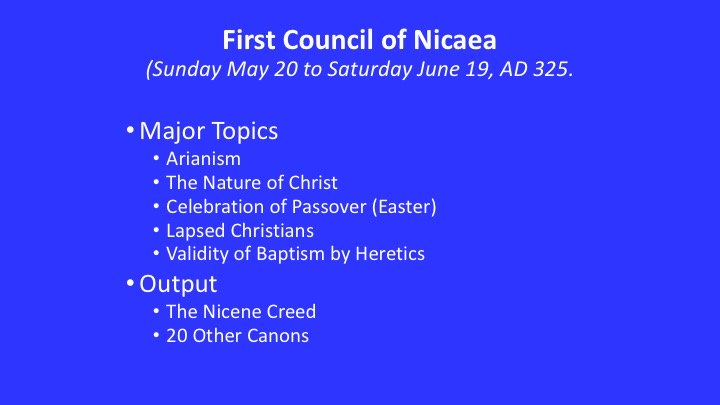
So, again, let’s begin the process of stepping through these church councils.
First Council of Nicaea (Sunday May 20 to Saturday June 19) AD 325.
The First Council of Nicaea was a council of Christian bishops convened in the city of Nicaea by the Roman Emperor Constantine I in AD 325. Constantine I organized the Council along the lines of the Roman Senate and presided over it, but did not cast any official vote.
Major Topics
- •Arianism
- •The Nature of Christ
- •Celebration of Passover (Easter)
- •Lapsed Christians
- •Validity of Baptism by Heretics
Output
- •The Nicene Creed
- •20 Other Canons
Its main accomplishments were settlement of the Christological issue of the divine nature of God the Son and his relationship to God the Father, the construction of the first part of the Nicene Creed, establishing uniform observance of the date of Easter, and promulgation of early canon law.
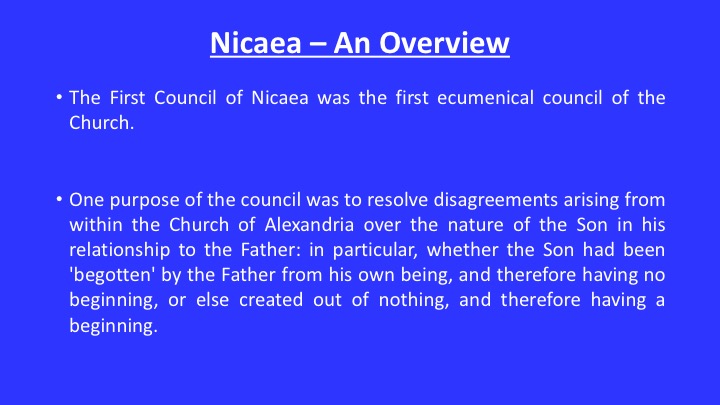
Overview
The First Council of Nicaea was the first ecumenical council of the Church. Most significantly, it resulted in the first uniform Christian doctrine, called the Nicene Creed. With the creation of the creed, a precedent was established for subsequent local and regional councils of Bishops (Synods) to create statements of belief and canons of doctrinal orthodoxy—the intent being to define unity of beliefs for the whole of Christendom.
Derived from Greek "ecumenical" means "worldwide" but generally is assumed to be limited to the known inhabited Earth, and at this time in history is synonymous with the Roman Empire.
One purpose of the council was to resolve disagreements arising from within the Church of Alexandria over the nature of the Son in his relationship to the Father: in particular, whether the Son had been 'begotten' by the Father from his own being, and therefore having no beginning, or else created out of nothing, and therefore having a beginning. St. Alexander of Alexandria and Athanasius took the first position; the popular presbyter Arius, from whom the term Arianism comes, took the second. The council decided against the Arians overwhelmingly (of the estimated 250–318 attendees, all but two agreed to sign the creed and these two, along with Arius, were banished to Illyria).
Historically significant as the first effort to attain consensus in the church through an assembly representing all of Christendom, the Council was the first occasion where the technical aspects of Christology were discussed. Through it a precedent was set for subsequent general councils to adopt creeds and canons. This council is generally considered the beginning of the period of the First seven Ecumenical Councils in the History of Christianity.
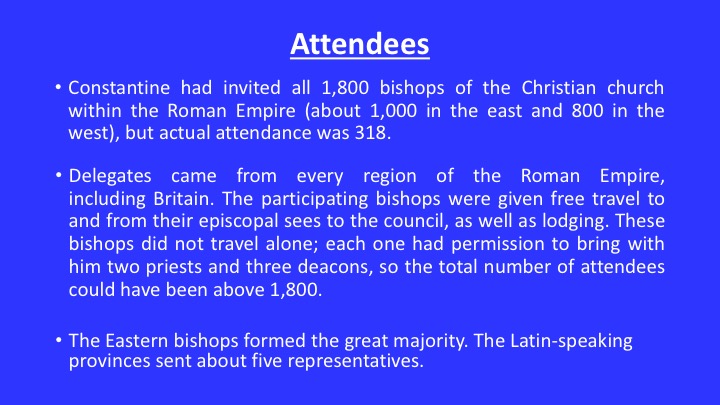
Attendees
Constantine had invited all 1,800 bishops of the Christian church within the Roman Empire (about 1,000 in the east and 800 in the west), but actual attendance was 318.
Delegates came from every region of the Roman Empire, including Britain. The participating bishops were given free travel to and from their episcopal sees to the council, as well as lodging. These bishops did not travel alone; each one had permission to bring with him two priests and three deacons, so the total number of attendees could have been above 1,800.
The Eastern bishops formed the great majority.
The Latin-speaking provinces sent about five representatives.
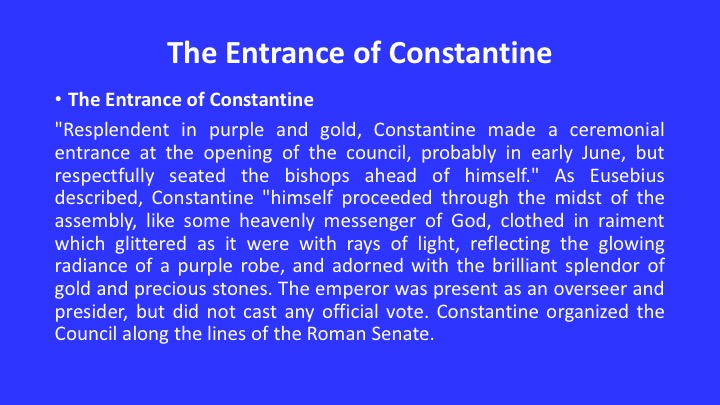
The Entrance of Constantine
"Resplendent in purple and gold, Constantine made a ceremonial entrance at the opening of the council, probably in early June, but respectfully seated the bishops ahead of himself." As Eusebius described, Constantine "himself proceeded through the midst of the assembly, like some heavenly messenger of God, clothed in raiment which glittered as it were with rays of light, reflecting the glowing radiance of a purple robe, and adorned with the brilliant splendor of gold and precious stones. The emperor was present as an overseer and presider, but did not cast any official vote. Constantine organized the Council along the lines of the Roman Senate. Hosius of Cordoba may have presided over its deliberations; he was probably one of the Papal legates. Eusebius of Nicomedia probably gave the welcoming address.
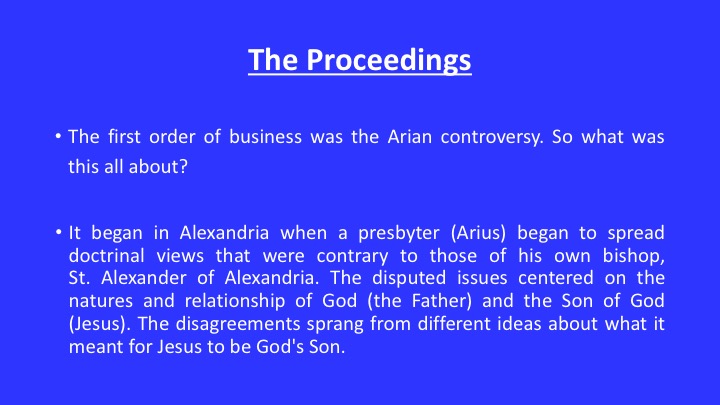
The Proceedings
The first order of business was the Arian controversy. So what was this all about?
The Arian controversy arose in Alexandria when the newly reinstated presbyter Arius began to spread doctrinal views that were contrary to those of his bishop, St. Alexander of Alexandria. The disputed issues centered on the natures and relationship of God (the Father) and the Son of God (Jesus). The disagreements sprang from different ideas about the Godhead and what it meant for Jesus to be God's Son.
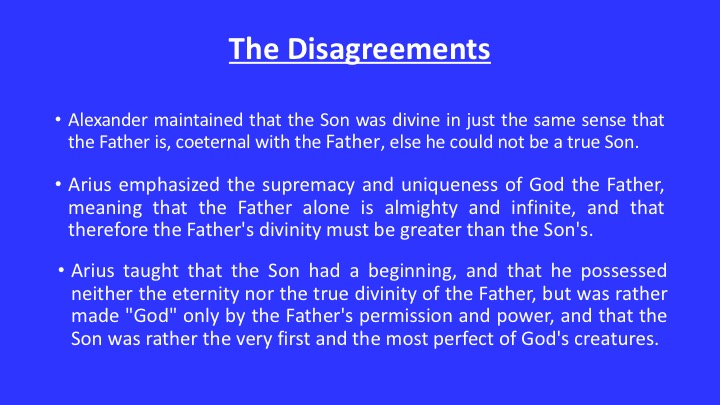
The Disagreements
Alexander maintained that the Son was divine in just the same sense that the Father is, coeternal with the Father, else he could not be a true Son.
Arius emphasized the supremacy and uniqueness of God the Father, meaning that the Father alone is almighty and infinite, and that therefore the Father's divinity must be greater than the Son's. Arius taught that the Son had a beginning, and that he possessed neither the eternity nor the true divinity of the Father, but was rather made "God" only by the Father's permission and power, and that the Son was rather the very first and the most perfect of God's creatures.

Language is the Enemy
Much of the debate hinged on the difference between being "born" or "created" and being "begotten". Arians saw these as essentially the same; followers of Alexander did not.
The exact meaning of many of the words used in the debates at Nicaea were still unclear to speakers of other languages. Greek words like "essence" (ousia), "substance" (hypostasis), "nature" (physis), "person" (prosopon) bore a variety of meanings drawn from pre-Christian philosophers, which could not but entail misunderstandings until they were cleared up. The word homoousia, in particular, was initially disliked by many bishops because of its associations with Gnostic heretics (who used it in their theology), and because their heresies had been condemned at the 264–268 Synods of Antioch.
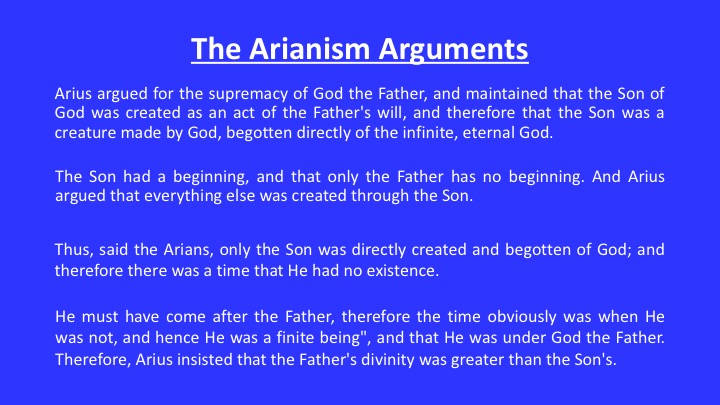
The Arianism Arguments
According to surviving accounts, the presbyter Arius argued for the supremacy of God the Father, and maintained that the Son of God was created as an act of the Father's will, and therefore that the Son was a creature made by God, begotten directly of the infinite, eternal God. Arius's argument was that the Son was God's very first production, before all ages.
The position being that the Son had a beginning, and that only the Father has no beginning. And Arius argued that everything else was created through the Son. Thus, said the Arians, only the Son was directly created and begotten of God; and therefore there was a time that He had no existence.
Arius believed that the Son of God was capable of His own free will of right and wrong, and that "were He in the truest sense a son, He must have come after the Father, therefore the time obviously was when He was not, and hence He was a finite being", and that He was under God the Father.
Therefore, Arius insisted that the Father's divinity was greater than the Son's. The Arians appealed to Scripture, quoting biblical statements such as "the Father is greater than I", and also that the Son is "firstborn of all creation".
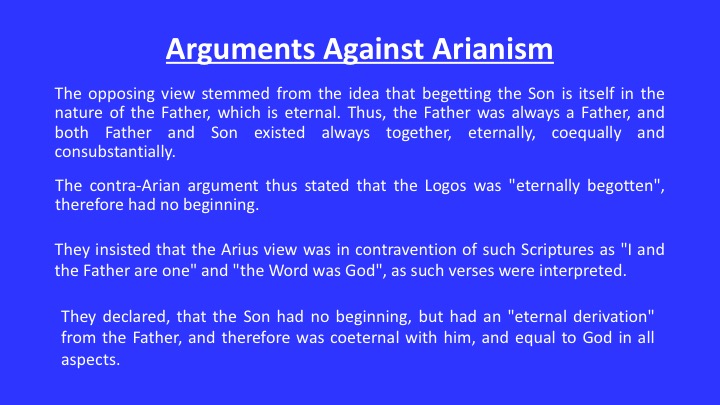
Arguments against Arianism
The opposing view stemmed from the idea that begetting the Son is itself in the nature of the Father, which is eternal. Thus, the Father was always a Father, and both Father and Son existed always together, eternally, coequally and consubstantially.
The contra-Arian argument thus stated that the Logos was "eternally begotten", therefore with no beginning. Those in opposition to Arius believed that to follow the Arian view destroyed the unity of the Godhead, and made the Son unequal to the Father.
They insisted that such a view was in contravention of such Scriptures as "I and the Father are one" and "the Word was God", as such verses were interpreted.
They declared that the Son had no beginning, but had an "eternal derivation" from the Father, and therefore was coeternal with him, and equal to God in all aspects.
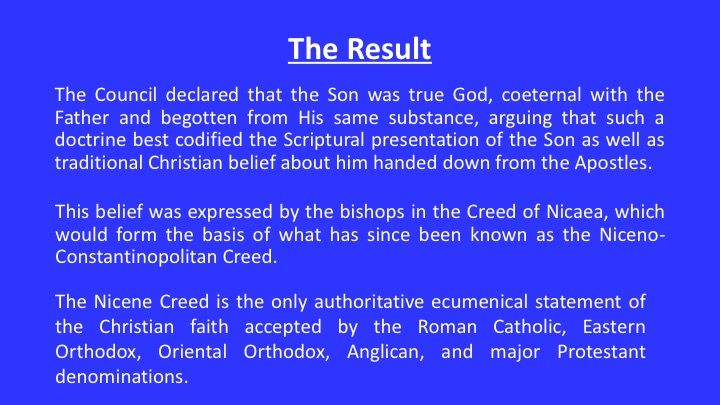
Result of the Debate
The Council declared that the Son was true God, coeternal with the Father and begotten from His same substance, arguing that such a doctrine best codified the Scriptural presentation of the Son as well as traditional Christian belief about him handed down from the Apostles. This belief was expressed by the bishops in the Creed of Nicaea, which would form the basis of what has since been known as the Niceno-Constantinopolitan Creed.
The Nicene Creed is the only authoritative ecumenical statement of the Christian faith accepted by the Roman Catholic, Eastern Orthodox, Oriental Orthodox, Anglican, and major Protestant denominations.
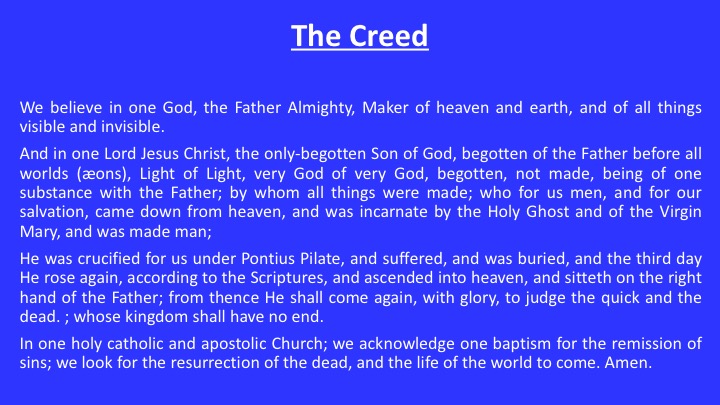
The Nicene Creed
We believe in one God, the Father Almighty, Maker of heaven and earth, and of all things visible and invisible.
And in one Lord Jesus Christ, the
only-begotten Son of God, begotten of the Father before all worlds (æons),
Light of Light, very God of very God, begotten, not made, being of one
substance with the Father; by whom all things were made;
who for us men, and for our salvation, came down from heaven, and was incarnate by the Holy Ghost and of the Virgin Mary, and was made man;
he was crucified for us under Pontius Pilate, and suffered, and was buried, and the third day he rose again, according to the Scriptures, and ascended into heaven, and sitteth on the right hand of the Father;
from thence he shall come again, with glory, to judge the quick and the dead. ; whose kingdom shall have no end.
In one holy catholic and apostolic
Church; we acknowledge one baptism for the remission of sins; we look for the
resurrection of the dead, and the life of the world to come. Amen.
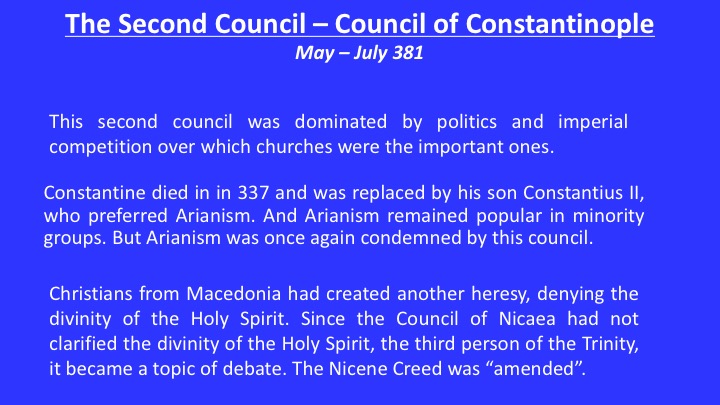
Second Council – Council of Constantinople
The Council of Nicaea in 325 had not ended the Arian controversy which it had been called to clarify.
Arius and his sympathizers, e.g. Eusebius of Nicomedia were admitted back into the church after ostensibly accepting the Nicene creed. Athanasius, bishop of Alexandria, the most vocal opponent of Arianism, was ultimately exiled through the machinations of Eusebius of Nicomedia. After the death of Constantine I in 337 and the accession of his Arian-leaning son Constantius II, open discussion of replacing Nicene creed itself began. Up until about 360, theological debates mainly dealt with the divinity of the Son, the second person of the Trinity. However, because the Council of Nicaea had not clarified the divinity of the Holy Spirit, the third person of the Trinity, it became a topic of debate. The Macedonians denied the divinity of the Holy Spirit. This was also known as Pneumatomachianism.
Despite all of these issues, this council eventually again condemned Arianism.

The Creed - Amended
A short paragraph affirming belief in the Holy Spirit was added.
We believe in one God, the Father Almighty, Maker of heaven and earth, and of all things visible and invisible.
And in one Lord Jesus Christ, the
only-begotten Son of God, begotten of the Father before all worlds (æons),
Light of Light, very God of very God, begotten, not made, being of one
substance with the Father; by whom all things were made;
who for us men, and for our salvation, came down from heaven, and was incarnate by the Holy Ghost and of the Virgin Mary, and was made man;
he was crucified for us under Pontius Pilate, and suffered, and was buried, and the third day he rose again, according to the Scriptures, and ascended into heaven, and sitteth on the right hand of the Father;
from thence he shall come again, with glory, to judge the quick and the dead. ; whose kingdom shall have no end.
And in the Holy Ghost, the Lord and Giver of life, who proceedeth from the Father, who with the Father and the Son together is worshiped and glorified, who spoke by the prophets.
In one holy catholic and apostolic Church; we acknowledge one baptism for the remission of sins; we look for the resurrection of the dead, and the life of the world to come. Amen.
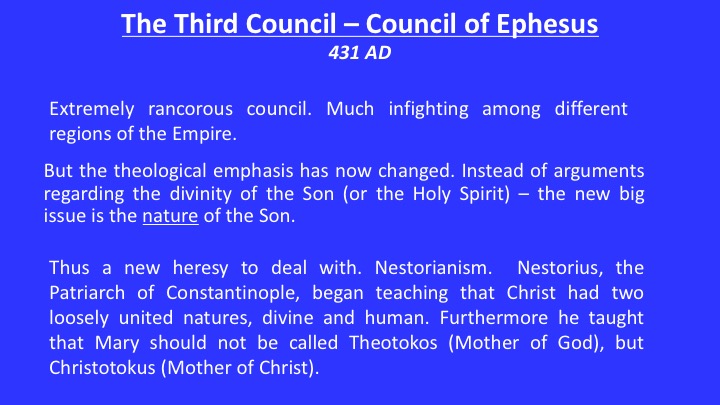
Third Council – Council of Ephesus
This developed quickly into an extremely rancorous council. Much infighting among different regions of the Empire. But the theological emphasis has now changed. Instead of arguments regarding the divinity of the Son (or the Holy Spirit) – the new big issue is the nature of the Son.
Multiple theses developed between the 5th and 7th centuries across the empire in regard to what is often called Christology – what is the nature of Christ.
Nestorianism is a Christological doctrine that emphasizes a distinction between the human and divine natures of the Son.
Nestorianism holds that Christ had two loosely united natures, divine and human, A conflicting and competing thesis developed called Monophysitism, which holds that the Son had but a single nature, because his human nature was totally absorbed into his divinity.
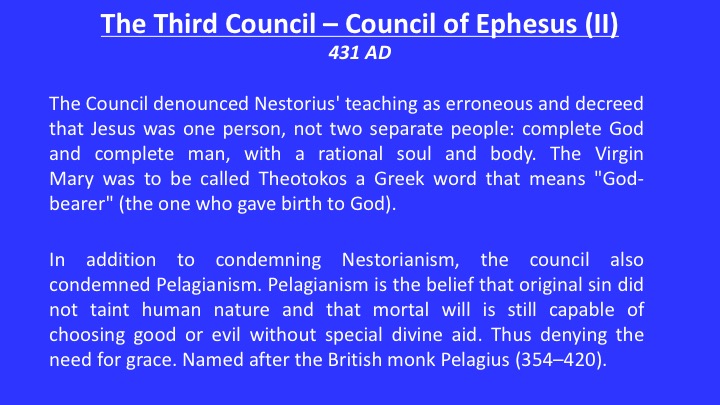
Third Council – Council of Ephesus (II)
The Council denounced Nestorius' teaching as erroneous and decreed that Jesus was one person, not two separate people: complete God and complete man, with a rational soul and body. The Virgin Mary was to be called Theotokos a Greek word that means "God-bearer" (the one who gave birth to God).
In addition to condemning Nestorianism, the council also condemned Pelagianism. Pelagianism is the belief that original sin did not taint human nature and that mortal will is still capable of choosing good or evil without special divine aid. Thus denying the need for grace. Named after the British monk Pelagius (354–420).
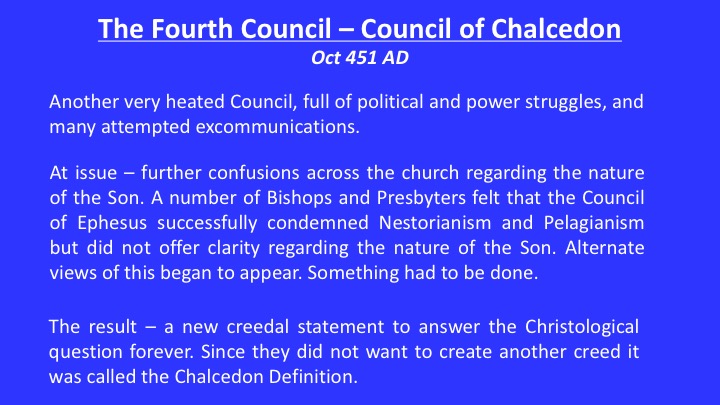
The Fourth Council – Council of Chalcedon
Another very heated Council, full of political and power struggles, and many attempted excommunications.
At issue – further confusions across the church regarding the nature of the Son. A number of Bishops and Presbyters felt that the Council of Ephesus successfully condemned Nestorianism and Pelagianism but did not offer clarity regarding the nature of the Son. Alternate views of this began to appear. Something had to be done.
The result – a new creedal statement to answer the Christological question forever. Since they did not want to create another creed it was called the Chalcedon Definition.
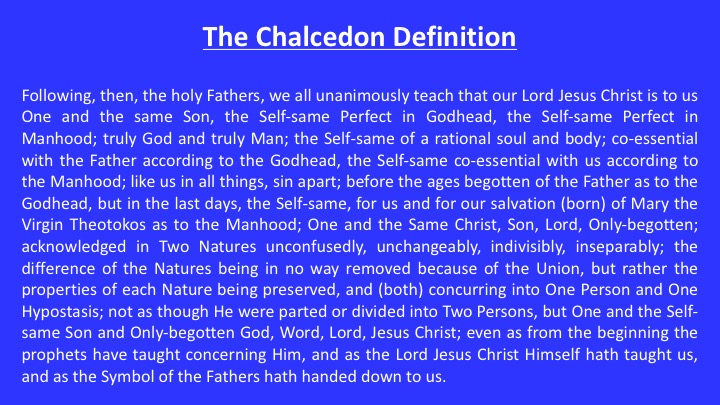
The Chalcedon Definition
Following, then, the holy Fathers, we all unanimously teach that our Lord Jesus Christ is to us One and the same Son, the Self-same Perfect in Godhead, the Self-same Perfect in Manhood; truly God and truly Man; the Self-same of a rational soul and body; co-essential with the Father according to the Godhead, the Self-same co-essential with us according to the Manhood; like us in all things, sin apart; before the ages begotten of the Father as to the Godhead, but in the last days, the Self-same, for us and for our salvation (born) of Mary the Virgin Theotokos as to the Manhood; One and the Same Christ, Son, Lord, Only-begotten; acknowledged in Two Natures unconfusedly, unchangeably, indivisibly, inseparably; the difference of the Natures being in no way removed because of the Union, but rather the properties of each Nature being preserved, and (both) concurring into One Person and One Hypostasis; not as though He were parted or divided into Two Persons, but One and the Self-same Son and Only-begotten God, Word, Lord, Jesus Christ; even as from the beginning the prophets have taught concerning Him, and as the Lord Jesus Christ Himself hath taught us, and as the Symbol of the Fathers hath handed down to us.
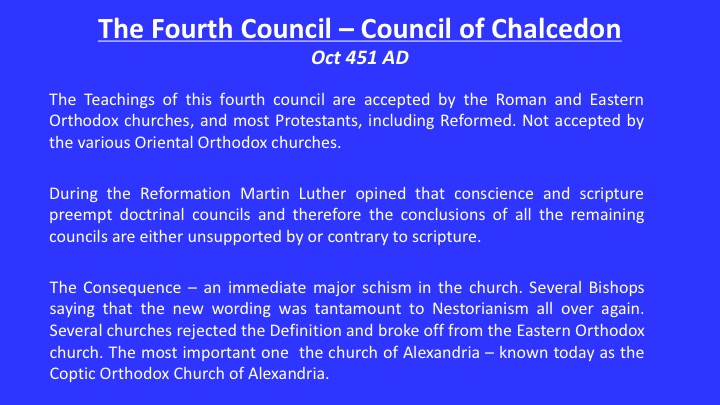
Fourth Council – Council of Chalcedon
The Teachings of this fourth council are accepted by the Roman and Eastern Orthodox churches, and most Protestants, including Reformed. Not accepted by the various Oriental Orthodox churches.
During the Reformation Martin Luther opined that conscience and scripture preempt doctrinal councils and therefore the conclusions of all the remaining councils are either unsupported by or contrary to scripture.
The Consequence – an immediate major schism in the church. Several Bishops saying that the new wording was tantamount to Nestorianism all over again. Several churches rejected the Definition and broke off from the Eastern Orthodox church. The most important one the church of Alexandria – known today as the Coptic Orthodox Church of Alexandria.
<< Audio >>